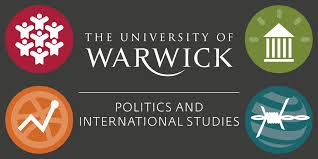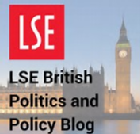Public Engagement
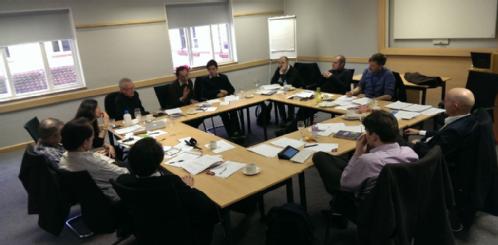 (1) FOOLS' GOLD. Along with colleagues from the Tax Justice Network, John Christensen and Nicholas Shaxson, I helped to launch a new initiative which seeks critical engagement with the idea that nations face off competitively against one another in an economic sense. In the UK, for example, 2013 was heralded as the year of the 'Global Race', with Prime Minister David Cameron using the concept of ever spiralling competitiveness imperatives as the key framing device for all of his speeches on the economy. An accompanying hashtag was created as the concept went mainstream. But what if there is no basis in economic thinking for such an approach and it reduces instead primarily to a means for already well-resourced economic actors to get what they want out of government policy? This has been the question that we have asked in the new Fools' Gold blog site hosted by the Tax Justice Network. The site emerged on the back of our inaugural meeting, hosted by the University of Warwick, held on February 16th 2015. The meeting brought together academics, lawyers, campaigners and journalists to discuss openly the issue of national competitiveness, to identify ways in which the political agenda surrounding national competitiveness results in a range of policies that debase the fabric of society, and to speculate on the best means to launch an effective political counter-attack. Given the expertise of the people attending our inaugural meeting, it is likely that the initial focus will be on issues relating to the regressive politics of tax competition, but this agenda will certainly broaden in due course.
(1) FOOLS' GOLD. Along with colleagues from the Tax Justice Network, John Christensen and Nicholas Shaxson, I helped to launch a new initiative which seeks critical engagement with the idea that nations face off competitively against one another in an economic sense. In the UK, for example, 2013 was heralded as the year of the 'Global Race', with Prime Minister David Cameron using the concept of ever spiralling competitiveness imperatives as the key framing device for all of his speeches on the economy. An accompanying hashtag was created as the concept went mainstream. But what if there is no basis in economic thinking for such an approach and it reduces instead primarily to a means for already well-resourced economic actors to get what they want out of government policy? This has been the question that we have asked in the new Fools' Gold blog site hosted by the Tax Justice Network. The site emerged on the back of our inaugural meeting, hosted by the University of Warwick, held on February 16th 2015. The meeting brought together academics, lawyers, campaigners and journalists to discuss openly the issue of national competitiveness, to identify ways in which the political agenda surrounding national competitiveness results in a range of policies that debase the fabric of society, and to speculate on the best means to launch an effective political counter-attack. Given the expertise of the people attending our inaugural meeting, it is likely that the initial focus will be on issues relating to the regressive politics of tax competition, but this agenda will certainly broaden in due course.
 The Tax Justice Network has the goal of nothing less than changing the climate of opinion surrounding the idea of national competitiveness. However, it is convinced that this will have to be a ten-year agenda if the same success it has already enjoyed on issues of tax avoidance is to be replicated. There will, as a consequence, be lots of subsequent activities to be posted here. In the meantime, check out the existing posts on the Fools' Gold site, which has only been up-and-running since March 2015. One of my jobs has been to help populate that site with short studies of how the concept of competitiveness has flitted in and out of the history of economic thought in various ways and with various degrees of political traction over time. These blogs therefore emerge directly out of my ongoing project research.
The Tax Justice Network has the goal of nothing less than changing the climate of opinion surrounding the idea of national competitiveness. However, it is convinced that this will have to be a ten-year agenda if the same success it has already enjoyed on issues of tax avoidance is to be replicated. There will, as a consequence, be lots of subsequent activities to be posted here. In the meantime, check out the existing posts on the Fools' Gold site, which has only been up-and-running since March 2015. One of my jobs has been to help populate that site with short studies of how the concept of competitiveness has flitted in and out of the history of economic thought in various ways and with various degrees of political traction over time. These blogs therefore emerge directly out of my ongoing project research.

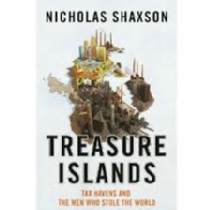
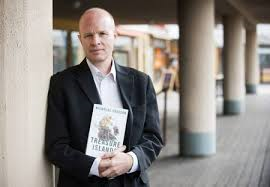
[Pictures: John Christensen on the left, Nicholas Shaxson on the right, and Nicholas's book Treasure Islands in the middle.]
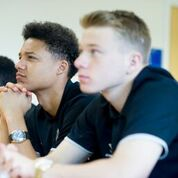 (2) CITIZENSHIP EDUCATION GAMES. I have always been interested in the way in which the principles of economics reappear in everyday language. Often those principles are only ever implicitly articulated and the speakers are not particularly sure how they come to be part of their consciousness let alone part of the manner in which they interact with other people. But they are detectable nonetheless, for instance in the use of the language of 'demand and supply' as drawn from the most basic of market models. In pursuing this interest I have been active in the Pathways to Politics events that my Department delivers to local schoolchildren, and I have been repackaging elements of my project research in the form of exercises that help the students to imagine alternatives to a system of market-based ethics. I am also on the Advisory Board of the People's Political Economy initiative of community education in Oxford, where the participants are given opportunities to think through how the political economy of the global financial crisis and the political economy of austerity in the UK is also the political economy of their own lives.
(2) CITIZENSHIP EDUCATION GAMES. I have always been interested in the way in which the principles of economics reappear in everyday language. Often those principles are only ever implicitly articulated and the speakers are not particularly sure how they come to be part of their consciousness let alone part of the manner in which they interact with other people. But they are detectable nonetheless, for instance in the use of the language of 'demand and supply' as drawn from the most basic of market models. In pursuing this interest I have been active in the Pathways to Politics events that my Department delivers to local schoolchildren, and I have been repackaging elements of my project research in the form of exercises that help the students to imagine alternatives to a system of market-based ethics. I am also on the Advisory Board of the People's Political Economy initiative of community education in Oxford, where the participants are given opportunities to think through how the political economy of the global financial crisis and the political economy of austerity in the UK is also the political economy of their own lives.
In an attempt to take these interests further, I am now exploring what it might mean to harness my abstract project findings on the history of economic thought to the Government's agenda for teaching economic citizenship in schools. Along with my departmental colleagues Chris Clarke, Chris Holmes and Chris Rogers, I am hoping to devise both a series of role-play scenarios and, in time, a board game that might help to show that the dilemmas of economic citizenship are much more complicated than, say, knowing how to set up a bank account and keep on top of your own personal finances. One interesting thing about almost all of the board games that schoolchildren in the UK will have grown up playing is that they have exactly the same implicit narrative built into them. The only winning strategy is to imagine yourself in a zero-sum context in which you need to accumulate more money than anyone else and their failures might well be a condition of your success. In other words, a system of market-based ethics is built into the very logic of these games. We are hoping to devise a game constructed on very different lines, where the sorts of decisions the players are invited to consider do not take the simple form of market-based ethics and therefore significantly complicate the idea of a simple winning strategy.

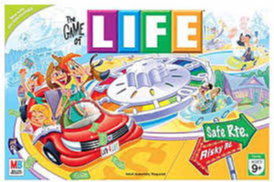
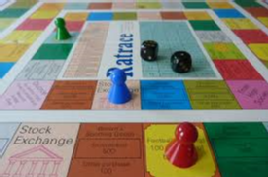
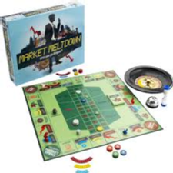
 (3) THEATRE GROUPS. I have been lucky enough during my Fellowship to have had many meetings with members of theatre groups, screenwriters and playwrights. In March of both 2014 and 2015 the China Plate Theatre Company has organised its 'This Is Tomorrow' programme through Warwick Arts Centre to bring together academic departments and members of the performing arts. I have been involved in both of the days when my department has participated. I look forward to doing more work in the future with the inspiring people that I have met at these events.
(3) THEATRE GROUPS. I have been lucky enough during my Fellowship to have had many meetings with members of theatre groups, screenwriters and playwrights. In March of both 2014 and 2015 the China Plate Theatre Company has organised its 'This Is Tomorrow' programme through Warwick Arts Centre to bring together academic departments and members of the performing arts. I have been involved in both of the days when my department has participated. I look forward to doing more work in the future with the inspiring people that I have met at these events.
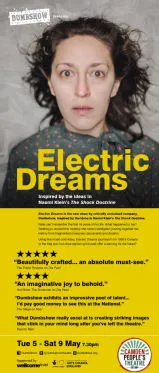 In addition, I have had a great time interacting with members of the Dumbshow Theatre Company. I first started chatting with company members Michael Bryer (Actor/Writer/Director) and Nicola Cutcher (Actor/Writer) during a two-week residency that they had at Warwick in January 2015 to work on their show, Electric Dreams, which is inspired by Naomi Klein's The Shock Doctrine (http://electricdreamsdumbshow.tumblr.com/). We discussed the political resonance in their script for an age that is dominated by assumptions that all forms of living must now accommodate themselves to the reality of market logic. Resignation to the idea that things cannot by different, I suggested, is often a powerful force in creating conditions of political apathy through which things stay much the same. It was with delight that I was able to witness how this theme had been increasingly incorporated into their script when I went to see the play during its first weekly run at Camden People's Theatre in May 2015. The librarians who act as the narrators of Electric Dreams use it to battle the feeling of helplessness they experience in response to their library being closed down due to public spending cuts. And they also use it to connect themselves to the life stories of a survivor of Pinochet's military coup in Chile from the 1970s and of a survivor of the psychologically intrusive 'corrective' electric shock therapy treatments from the 1980s.
In addition, I have had a great time interacting with members of the Dumbshow Theatre Company. I first started chatting with company members Michael Bryer (Actor/Writer/Director) and Nicola Cutcher (Actor/Writer) during a two-week residency that they had at Warwick in January 2015 to work on their show, Electric Dreams, which is inspired by Naomi Klein's The Shock Doctrine (http://electricdreamsdumbshow.tumblr.com/). We discussed the political resonance in their script for an age that is dominated by assumptions that all forms of living must now accommodate themselves to the reality of market logic. Resignation to the idea that things cannot by different, I suggested, is often a powerful force in creating conditions of political apathy through which things stay much the same. It was with delight that I was able to witness how this theme had been increasingly incorporated into their script when I went to see the play during its first weekly run at Camden People's Theatre in May 2015. The librarians who act as the narrators of Electric Dreams use it to battle the feeling of helplessness they experience in response to their library being closed down due to public spending cuts. And they also use it to connect themselves to the life stories of a survivor of Pinochet's military coup in Chile from the 1970s and of a survivor of the psychologically intrusive 'corrective' electric shock therapy treatments from the 1980s.
The cast of Electric Dreams held an after-show discussion of their new play on Wednesday 6th May 2015, which had played to a packed house. I was invited to appear on the panel alongside Michael and Nicola and one-time Dumbshow collaborator Ryan Shorthouse. Ryan is now the Founder and Chief Executive of the liberal conservative think tank, Bright Blue. Photographs taken during the after-show discussion appear below, and because the whole event was recorded there is a transcript of the discussion on the Dumbshow website: http://electricdreamsdumbshow.tumblr.com/post/125174653356/post-show-talk-at-camden-peoples-theatre-on-the.
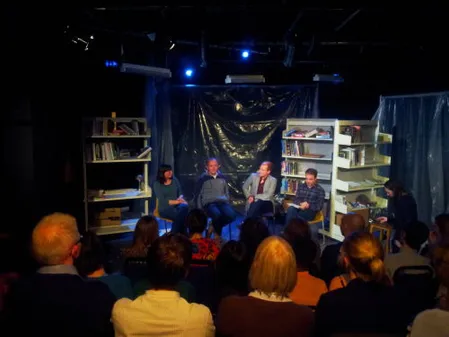
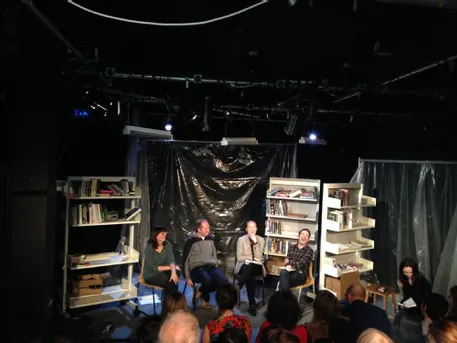
[Pictures: from left to right, Nicola Cutcher, me, Ryan Shorthouse and Michael Bryher.]
(4) COLONIAL HANGOVER PROJECT. I have attempted to bring impact, public engagement and outreach together in the organisation of Schools Days. Sometimes this involves partner schools in my Department's Widening Participation programme coming on to campus, and at other times this involves me travelling to partner schools. One of the central elements of this strategy has been the development of the Colonial Hangover project, which began life in 2015/2016 as a collaboration involving me, two of our former undergraduate students, Nikita Shah and Honey Fafowora, and my Department's Widening Participation Officer, Shahnaz Akhter (in the first three pictures below in that order). During academic year 2016/2017 my Department has generously funded two undergraduate student research assistants to help me and Shahnaz on the project. They are Taznema Khatun and Jonas Eberhardt (in the final two pictures below). It remains a collaborative activity, and I continue to be grateful for all the effort that the other project members have put in.


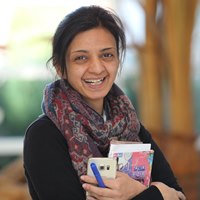


Our aim has been to get students to think of the way that the legacies of the British Empire continue to shape many of our experiences today, in particular the influence it has on many of the markets in which we operate as consumer, producer or worker. I have published an article in New Political Economy, for instance, that shows how the conceptual apparatus still in use today to understand the basic structures of global trade is, in essence, read off from the early European experience of 'free' trade, and how that experience was indivisible from the struggle for Empire. Imperial legacies therefore continue to resonate in so many seemingly mundane aspects of everyday life within the modern consumer society. We have been encouraging our participating students at Schools Days to try to unlock these legacies in their own minds by thinking through the relationship that previous generations of their family members had to either the maintenance or the disruption of Empire. We have also been encouraging them to learn about the way that the legacies of the British Empire continue to be inscribed in the built environment of the towns and cities in which they live and that they call home. They leave a constant reminder there, but it can be one that is easily overlooked if the historical stories that link past to present are not known.
A public lecture I delivered on the Colonial Hangover project on one of the Schools Days in January 2017 is available to listen to on the podcasts section of my Departmental webpage. I also participated in a roundtable discussion at the Belgrade Theatre in Coventry in July 2016 at the annual Mela celebration of local South Asian arts and culture. The roundtable accompanied an art exhibition that was displayed in the theatre for the preceding two weeks on the Colonial Hangover theme. Further events took place in academic year 2016-2017, including a very successful conference that brought together our undergraduate students with our Schools Day participants. And still further events are scheduled for academic year 2017-2018, including a specially commissioned dance by the Sapnay School of Dance, a play that is being written by Shahnaz Akhter, film screenings at Warwick Arts Centre to commemorate the 70th anniversary of the partition that created the modern states of India and Pakistan, and a new level of engagement with Lloyds Bank's Inclusion and Diversity Team. Once again the conference will be held towards the end of the academic year, partly as a means of showcasing the winning entries into our annual competition, where the first prize will continue to be for the winner to take their class to a special screening that will be arranged just for them by the British Film Institute.

[Pictures 1 & 4: me at the Joseph Chamberlain Sixth Form Centre in Birmingham. Pictures 2 & 3: me at the Coventry Belgrade Mela, alongside Jason Scott Tilley and Tarla Patel, relatives of the two photographers whose pictures made up the exhibition, Bert Scott and Maganbhai Patel, better known as Masterji. Behind me is a photograph of my paternal grandfather, who served in the British Imperial Army in India in the 1920s.]
In August 2017 I participated in delivering the Colonial Hangover Summer School for twenty A-level students who were visiting Warwick as part of a Sutton Trust initiative. The Sutton Trust specialises in providing educational opportunities for students who come from communities with traditionally low participation rates in higher education. The aim was to show the students just how many of their everyday experiences invoke imagery related to the British Empire, just so long as they know what they are looking for. For instance, this might be in terms of what they consume, what they aspire to as consumers, or the companies that they deal with when making their economic identities through market transactions. I delivered one lecture on the current controversies surrounding political campaigns about whether statues should stand or fall, and what this might mean more generally for understanding the political and economic systems in which we live; I delivered another lecture that took the form of a virtual walking tour of Birmingham, showing how the Empire has left its mark throughout the built environment of the city and still creates a constant context today for navigating the mundane aspects of everyday economic life.
One of the Sutton Trust students responded to the University's request for feedback, and this is what she said: "The highlight of the week for me was by far the academic side, centred on the lasting impacts of the British Empire. I was exposed to challenging and intriguing concepts that I had never thought about prior to the summer school. My understanding of my cultural heritage/identity was strengthened and I left with a feeling of empowerment. This experience was fuelled by the amazing people on the politics stream who created an environment where we all felt safe to share personal experiences and challenge each other's way of thinking."
 In October 2017 I received the first invitation to take the Colonial Hangover project into the workplace. I was invited to speak at a Future Leaders Event organised by Lloyds Banking Group's Inclusion and Diversity Division. The event took place in The Shard in London. 160 Lloyds staff and guests were invited to hear a range of talks about the difficulties experienced by BAME colleagues in moving through the ranks of their organisation and into middle management. I spoke about the Colonial Hangover project, linking the work that I do on one of my Department's schools outreach projects to the distance that large organisations still have to travel if they are to provide a context for their staff to experience a working environment that survives the charge of being institutionally racist. I argued that an organisation that is only partially aware of its own history is an organisation that cannot guarantee that it will survive such a charge. I illustrated this through reference to the imperial legacies that our Widening Participation students learn about through the Colonial Hangover project and the imperial legacies that all of Britain's banks still have. The evening was a great success, and further talks will follow as a means of deepening the link.
In October 2017 I received the first invitation to take the Colonial Hangover project into the workplace. I was invited to speak at a Future Leaders Event organised by Lloyds Banking Group's Inclusion and Diversity Division. The event took place in The Shard in London. 160 Lloyds staff and guests were invited to hear a range of talks about the difficulties experienced by BAME colleagues in moving through the ranks of their organisation and into middle management. I spoke about the Colonial Hangover project, linking the work that I do on one of my Department's schools outreach projects to the distance that large organisations still have to travel if they are to provide a context for their staff to experience a working environment that survives the charge of being institutionally racist. I argued that an organisation that is only partially aware of its own history is an organisation that cannot guarantee that it will survive such a charge. I illustrated this through reference to the imperial legacies that our Widening Participation students learn about through the Colonial Hangover project and the imperial legacies that all of Britain's banks still have. The evening was a great success, and further talks will follow as a means of deepening the link.
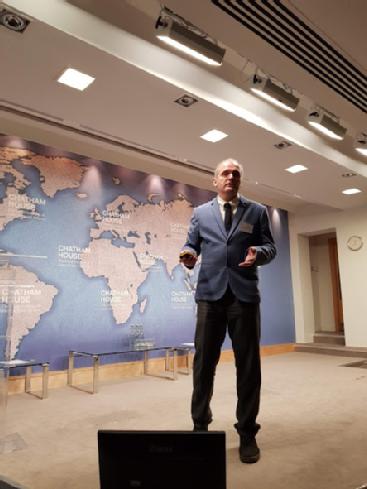
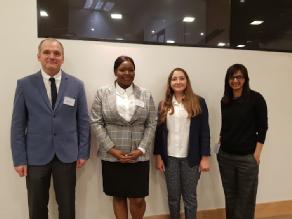 In October 2018 I was invited to speak again at Lloyds Bank's Inclusion and Diversity Division's event at Chatham House in London to celebrate Black History Month. The event was entitled 'A Mile in My Shoes', closing with a roundtable on the theme of 'The B in BAME'. I spoke this time around to the title, 'Windrush, Brexit and the Racialised Language of British History'. 150 Lloyds staff and guests were invited to hear a range of talks that reflected on the difficulties of a distinctively black history finding its voice in modern Britain and what this might mean for people of colour working within an organisation like Lloyds. As the one white person invited to speak, I thought that it was beholden upon me to talk about the continuing effects of white privilege and how this phenomenon is currently evident within the Brexit debate. This same theme was prominent in lots of the questions asked at the 'Question Time'-style roundtable, where the audience asked the panel members whether they believed contemporary Britain was moving closer towards or further away from racial equality.
In October 2018 I was invited to speak again at Lloyds Bank's Inclusion and Diversity Division's event at Chatham House in London to celebrate Black History Month. The event was entitled 'A Mile in My Shoes', closing with a roundtable on the theme of 'The B in BAME'. I spoke this time around to the title, 'Windrush, Brexit and the Racialised Language of British History'. 150 Lloyds staff and guests were invited to hear a range of talks that reflected on the difficulties of a distinctively black history finding its voice in modern Britain and what this might mean for people of colour working within an organisation like Lloyds. As the one white person invited to speak, I thought that it was beholden upon me to talk about the continuing effects of white privilege and how this phenomenon is currently evident within the Brexit debate. This same theme was prominent in lots of the questions asked at the 'Question Time'-style roundtable, where the audience asked the panel members whether they believed contemporary Britain was moving closer towards or further away from racial equality.
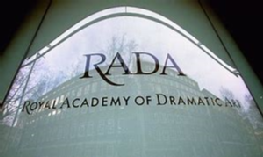 In June 2018 the outer limits of the Colonial Hangover project were extended still further, this time in partnership with the Royal Academy of Dramatic Art. We were joined by members of RADA to provide opportunities for Year 10 students from Coventry and Warwickshire to study for their Shakespeare Awards alongside following the Colonial Hangover project. In our first engagement with the students I delivered a lecture that looked at how 'empire' has come back into vogue following the referendum result that will see the UK leave the European Union in 2019. I focused in particular on territorial imaginaries of the 'Greater Britain' of the Victorian era and how they are being rejuvenated in the May Government's strategy for international market-making under its conception of a free-trading 'Global Britain'. This set the scene for a follow-up event later the same month, again at the University of Warwick, where the students were invited to a Politics of Shakespeare Day, with questions of territoriality and empire in Shakespeare's plays once again coming to the fore.
In June 2018 the outer limits of the Colonial Hangover project were extended still further, this time in partnership with the Royal Academy of Dramatic Art. We were joined by members of RADA to provide opportunities for Year 10 students from Coventry and Warwickshire to study for their Shakespeare Awards alongside following the Colonial Hangover project. In our first engagement with the students I delivered a lecture that looked at how 'empire' has come back into vogue following the referendum result that will see the UK leave the European Union in 2019. I focused in particular on territorial imaginaries of the 'Greater Britain' of the Victorian era and how they are being rejuvenated in the May Government's strategy for international market-making under its conception of a free-trading 'Global Britain'. This set the scene for a follow-up event later the same month, again at the University of Warwick, where the students were invited to a Politics of Shakespeare Day, with questions of territoriality and empire in Shakespeare's plays once again coming to the fore.
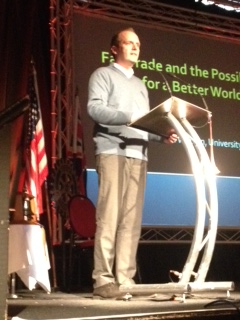 (5) ROTARY DISTRICT CONFERENCE. I always enjoy getting out and about to talk to people who would not normally have any engagement with academic research. One such recent highlight was when I was invited to speak at the Annual Conference of District 1210 of the Rotary Club of Great Britain and Ireland. This was held at the 500-seat lecture hall at Venue Cymru in Llandudno on September 28th 2014. I was asked to speak to the title, 'Fair Trade and Possibilities for a Better World', so broadened out the theme to incorporate some of my ongoing research for my Rethinking the Market project. The central message I delivered to the Rotary members in attendance at the conference was that they had it within their hands to act for a better world beyond their collective charity fundraising activities. I suggested that the increasing visibility of Fair Trade products made it possible to turn everyday shopping trips to the local supermarket at least in part to the quest to do right by other people. This would be to promote forms of behaviour that exist outside of the context of straightforward market-based ethics.
(5) ROTARY DISTRICT CONFERENCE. I always enjoy getting out and about to talk to people who would not normally have any engagement with academic research. One such recent highlight was when I was invited to speak at the Annual Conference of District 1210 of the Rotary Club of Great Britain and Ireland. This was held at the 500-seat lecture hall at Venue Cymru in Llandudno on September 28th 2014. I was asked to speak to the title, 'Fair Trade and Possibilities for a Better World', so broadened out the theme to incorporate some of my ongoing research for my Rethinking the Market project. The central message I delivered to the Rotary members in attendance at the conference was that they had it within their hands to act for a better world beyond their collective charity fundraising activities. I suggested that the increasing visibility of Fair Trade products made it possible to turn everyday shopping trips to the local supermarket at least in part to the quest to do right by other people. This would be to promote forms of behaviour that exist outside of the context of straightforward market-based ethics.
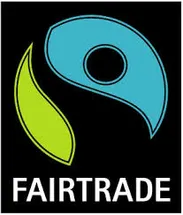 I had heard the Rotary International Director-Elect, Karen Wentz, earlier in the conference suggest that Rotary members were predisposed never to say 'no'. So I finished my talk with a cheeky challenge. I noted just how many things that had been served during conference meals could have been sourced from Fair Trade suppliers but had not been. I then asked what it would be like - in particular, how many distant farmers' lives would be made materially better off - if at future District Conferences the market ethic of always buying from the cheapest possible supplier was overlooked in favour of always buying from suppliers receiving accreditation from Fairtade International in the form of the well-known Fairtrade Mark. However, my challenge was more small-scale than this. It was to ask those present to consider having one fully Fair Trade meal a year at their clubs or for the District Conference in future to have one meal which was fully Fair Trade. District 1210 indicated that it was willing to accept my challenge, and I hope to be invited back in the years ahead to check on progress.
I had heard the Rotary International Director-Elect, Karen Wentz, earlier in the conference suggest that Rotary members were predisposed never to say 'no'. So I finished my talk with a cheeky challenge. I noted just how many things that had been served during conference meals could have been sourced from Fair Trade suppliers but had not been. I then asked what it would be like - in particular, how many distant farmers' lives would be made materially better off - if at future District Conferences the market ethic of always buying from the cheapest possible supplier was overlooked in favour of always buying from suppliers receiving accreditation from Fairtade International in the form of the well-known Fairtrade Mark. However, my challenge was more small-scale than this. It was to ask those present to consider having one fully Fair Trade meal a year at their clubs or for the District Conference in future to have one meal which was fully Fair Trade. District 1210 indicated that it was willing to accept my challenge, and I hope to be invited back in the years ahead to check on progress.
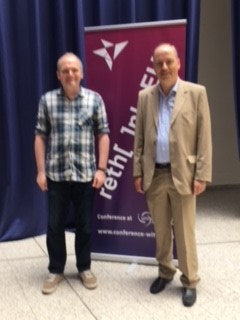 (6) TALKS. I have been invited to deliver a number of talks to various non-academic groups during the course of my Fellowship. (i) One example was to speak about market arrangements post-Brexit to a group of young Europeans and members of the European Parliament staff at Universität Witten/Herdecke. The picture on the right shows me with the Secretary General of the European Parliament, Klaus Welle. (ii) Another invitation was to speak to the Nuneaton Branch of the Historical Association about Adam Smith's conception of empire and how this is to be understood in relation to his theory of markets. Smith used the experience of Glasgow merchants as role models for exemplifying his theory of markets, treating their decisions as being in some way archetypal of market-based behaviour. However, these were specifically tobacco merchants in the Glasgow of his day, and they made their money from their close association with plantation owners in settler colonies in the Americas, whose business models in turn relied upon the exploitation of slave labour. Yet Smith was a constant critic of the institutions of both empire and slavery, suggesting the existence of clear tensions when attempting to read his work as a whole.
(6) TALKS. I have been invited to deliver a number of talks to various non-academic groups during the course of my Fellowship. (i) One example was to speak about market arrangements post-Brexit to a group of young Europeans and members of the European Parliament staff at Universität Witten/Herdecke. The picture on the right shows me with the Secretary General of the European Parliament, Klaus Welle. (ii) Another invitation was to speak to the Nuneaton Branch of the Historical Association about Adam Smith's conception of empire and how this is to be understood in relation to his theory of markets. Smith used the experience of Glasgow merchants as role models for exemplifying his theory of markets, treating their decisions as being in some way archetypal of market-based behaviour. However, these were specifically tobacco merchants in the Glasgow of his day, and they made their money from their close association with plantation owners in settler colonies in the Americas, whose business models in turn relied upon the exploitation of slave labour. Yet Smith was a constant critic of the institutions of both empire and slavery, suggesting the existence of clear tensions when attempting to read his work as a whole.
(7) BLOGGING. I have blogged as much as I can during my Fellowship in an attempt to show how my research translates into interventions into political debates of contemporary public interest. My efforts in this regard have been primarily concentrated on three blog sites. (i) I have written a number of short studies on the history of competitiveness thinking for the Fools' Gold website run by the Tax Justice Network. (ii) I have published a series of pieces on British budgetary politics for Speri Comment, the blog site of the Sheffield Political Economy Research Institute. (iii) I have also written for my Department's blog, Politics Reconsidered, on consumption issues including the rise of food bank Britain. More details of these posts can be found in the Activities and Outputs section of this website by searching using the tag 'blog post'. (iv) I have published a two-part blog post on different Brexit scenarios for Oxford University Press. (v) I recorded an interview for the e-auction innovators, Firesouls, which has been written up in two parts on their blog site.



